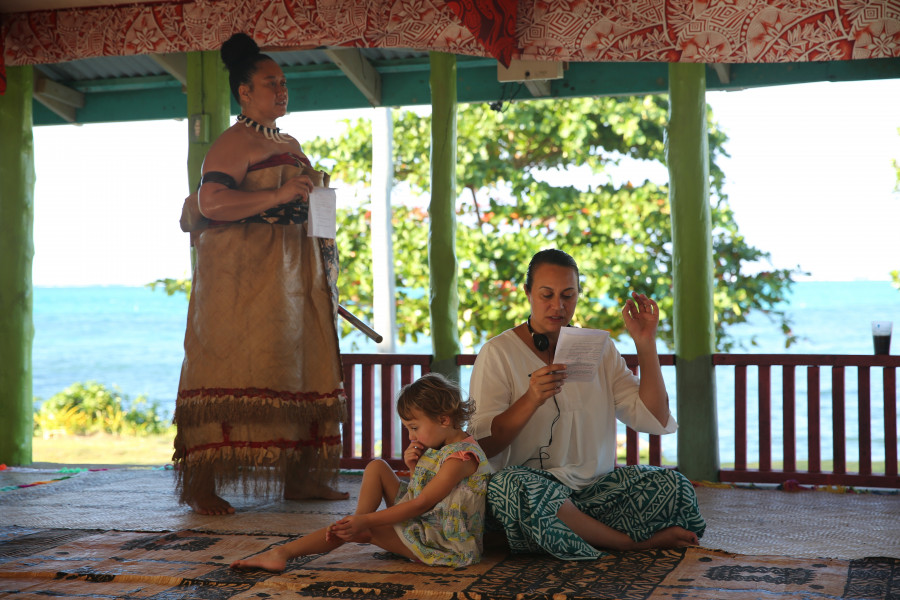Vai reminds Director her own experiences matter
Vai reminds Director her own experiences matter

Vai is a film on many peoples’ radars this year following its premiere at the Berlin Film Festival in February, the SXSW Festival in Texas in March, and more recently in New Zealand.
Made by nine female Pacific filmmakers, and filmed in seven different Pacific countries including Fiji, Tonga, Solomon Islands, Cook Islands, Samoa, Niue and New Zealand, it is about the journey of Vai, played by a different indigenous actress in each of the Pacific countries.
One of those filmmakers is Marina Alofagia McCartney, who wrote and directed the Samoan piece said she is not surprised at how well the film is being received.
“You are always slightly nervous about how your work will be received – but I do think the successful reception of the film to date only further proves our own communities as well as audiences and film influencers worldwide are hungry for stories about our people, which are told through our eyes,” Marina says.
The fact Vai is the first fictional feature in the history of New Zealand cinema with females of Pacific descent in all above-the-line roles (Writer, Director, and Producer) and in lead roles, should be celebrated as well as how the public receive it, she adds.
Marina was born and raised in Manukau from a Geordie father, Samoan mother and Cook Islands step-mother, and has always been powerfully aware of her cultural heritage.
After just over a decade in the fashion industry, as Miss New Zealand, a title she collected in 1996 and one of the few fashion models of Pacific descent, she returned to the University of Auckland to study film, and graduated with a MA (First Class Honours).
Marina earned acclaim for her film Milk & Honey, which gave a Pacific perspective on the infamous dawn raids of the 1970s.
The film was selected for the 2012 NZ International Film Festival[m2] as one of the top six New Zealand short films for the year.
It followed her previous 2010 film Granda, about a young Samoan man connecting with his grandfather.
Along with her fellow filmmakers – Sharon and Nicole Whippy, Becs Arahanga, Amberley Jo Aumua, Matasila Freshwater, Dianna Fuemana, Mīria George and 'Ofa-ki Guttenbeil-Likiliki - Marina was inspired to create Vai with an existing framework and creative approach in place; capturing each vignette in a single continuous shot.
“As Vai is a collaborative feature it meant while we had autonomy over our individual piece, it needed to work as a cohesive overall feature length story.
“This required a lot of give and take and collaboration with each other and the producers who worked hard to ensure the overall narrative was nurtured and protected,” she explains.
The highlights of producing Vai were also the biggest challenges, Marina says.
“The technical parameters – one day to rehearse, one day to shoot, one continuous 10 minute shot to tell the story – were a big challenge, but it was also incredibly rewarding once I had realised we had our take.
“I am a single mum to a five-year-old daughter and I was working a full-time job during Vai which was also incredibly challenging and at times overwhelming.
“However, it made me realise not only what I am capable of, but what I can achieve in the future with my film career.”
Making Vai also reminded Marina of her experiences as a New Zealand-born Samoan and Geordie woman matter.
“When our perspectives and worldviews continue to be marginalised on and behind the big screen it is essential we stand together and demand our narratives and stories told by us become the norm.”
Marina hopes Vai serves as a gentle reminder that our Oceanic cultures are not an impediment to our existence, but the very thing that empowers us mentally, emotionally and spiritually, she says.
“Also, I hope it validates their experiences as Moana people living in New Zealand and that each audience member finds something in Vai that resonates with them.”
There is no rest for Marina, who is also a PhD candidate studying Oceanic filmmaking and has a feature film in development titled The Return.
It is about a New Zealand-born Samoan woman, who must fulfil her mother’s dying wish to be buried back in Samoa, a country and culture she been disconnected from.
